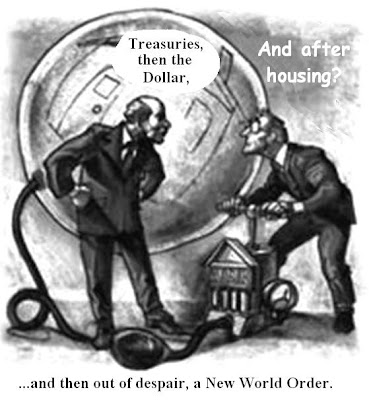 The Treasury bubble is likely to be much less destructive than the Internet and Housing Bubbles.
The Treasury bubble is likely to be much less destructive than the Internet and Housing Bubbles.
The bubble in the US dollar, however, if one wishes to consider it as an adjunct or outcome of the bubble in Treasuries, has the potential to be disruptive and devastating
Reuters
Buffett says U.S. Treasury bubble one for the ages
By Jonathan Stempel
Sat Feb 28, 2009 9:31pm GMT
NEW YORK (Reuters) - Warren Buffett, whose Berkshire Hathaway Inc. sits on $25.54 billion (17.8 billion pounds) of cash, said worried investors are making a costly mistake by buying up U.S. Treasuries that yield almost nothing.
In his widely read annual letter to Berkshire shareholders, the man many consider the world's most revered investor said investors are engulfed by a "paralyzing fear" stemming from the credit crisis and falling housing and stock prices. Treasury prices have benefited as investors flocked to the perceived safety of the "triple-A" rated debt.
But Buffett said that with the U.S. Federal Reserve and Treasury Department going "all in" to jump-start an economy shrinking at the fastest pace since 1982, "once-unthinkable dosages" of stimulus will likely spur an "onslaught" of inflation, an enemy of fixed-income investors.
"The investment world has gone from underpricing risk to overpricing it," Buffett wrote. "Cash is earning close to nothing and will surely find its purchasing power eroded over time."
"When the financial history of this decade is written, it will surely speak of the Internet bubble of the late 1990s and the housing bubble of the early 2000s," he went on. "But the U.S. Treasury bond bubble of late 2008 may be regarded as almost equally extraordinary."
DISMAY OVER MORTGAGE PRACTICES
Investors' flight to quality followed years of excessive borrowing, especially in housing, and Buffett used his letter to make plain his dismay with a variety of mortgage lenders.
He said many ignored Lending 101 by not checking customers' ability to pay off home loans, or foisting "teaser" rates that reset to higher unaffordable levels.
In contrast, Buffett said, Berkshire's manufactured housing unit Clayton Homes had a 3.6 percent foreclosure rate at year end on loans it made, up from 2.9 percent in 2006, though more than one in three borrowers had "subprime" credit scores. The unit was profitable in 2008, earning $206 million before taxes, though earnings fell 61 percent, Berkshire said.
"The present housing debacle should teach home buyers, lenders, brokers and government some simple lessons that will ensure stability," Buffett wrote. "Home purchases should involve an honest-to-God down payment of at least 10 percent and monthly payments that can be comfortably handled by the borrower's income. That income should be carefully verified."
28 February 2009
The Bubble In US Treasuries and Its Implications
Category:
bubbles,
Treasury Bonds





























